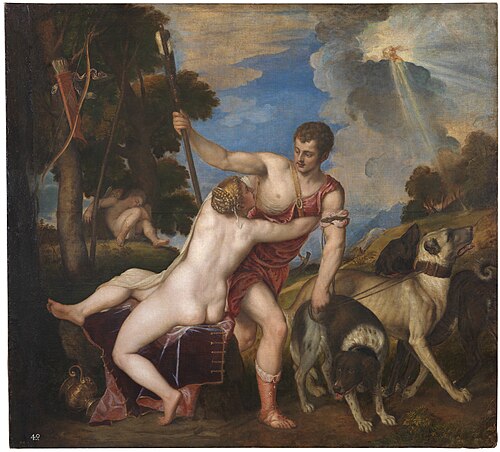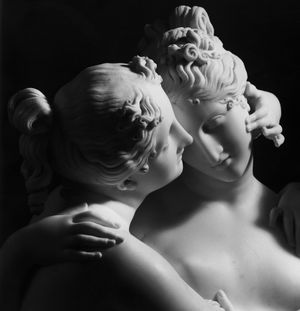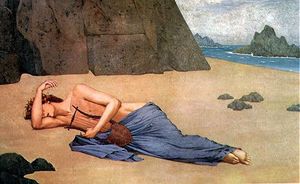Notes on Ovid’s Metamorphoses

Like Euripides was for Athens, Ovid was for Rome: but less an iconoclast and more a satirist, Ovid was devoted to the education of Rome’s elite in the ways of love. His verse aimed at subverting what he saw as an authoritarian imposition of moral reform embodied by his contemporary, Virgil. Ovid’s major work, the Metamorphoses, makes pains to be anti-Aeneid in its disregard of authority and the interests of the state: it has no epic hero, it critiques unity by contriving connections, and does not lead to a central order. Rather than taking an elevated tone, the Metamorphoses plays with style and theme to make this history’s first anti-epic. Yet, despite the playful wit and iconoclasm of the Metamorphoses, Ovid takes on some themes that have truly serious nature, even for readers today.
The central concern of the Metamorphoses is, obvious by its title, changes in shape. This theme supplies Ovid’s revisionary mythmaking with a narrative link that’s remains as fluid and changing as a river winding its way to the sea. Ovid’s anti-epic introduction makes this clear:
| “ | My soul would sing of metamorphoses. |
” |
Invoking only to satirize, Ovid uses an epic style, but in the conditional. His matter has already been written by the lust and caprices of the gods: their desires promote chaos, not order, and we humans must pay for that, often physically changing in the process to avoid the authoritarian desires of that which seeks to control us. The Metamorphoses tries to avoid the forced order of form by embracing formlessness as an anti-epic. Privileging no single point of view, Ovid’s masterpiece highlights the fleetingness of form while poking fun at the human propensity to make connections and suggest absolutes. Even his invocation suggests chance and fluidity by tossing his words to all the gods, rather than the traditional fount and guarantor of knowledge, the Muse Calliope. Ovid’s anti-epic is continual change through space as well as time.
Like his major theme, Ovid plays with narrative technique from story to story. Unlike Virgil’s serious, orderly Aeneid, the Metamorphoses takes shots at everything, beginning with the destructive outcome from the lust of male gods. These gods are not dignified as they are in Virgil, oh no. These gods and godlings are capricious: they might see a young nymph or naiad and decide they are in love, or at least in lust. Seeking to satisfy their desire in anyway they can, they come charging after the young woman — usually a virgin — often terrifyingly but sometimes comically until they possess the object of their desire, changing her forever.

And since this is Ovid’s Metamorphoses, she is always physically changed because of the experience: Daphne turns into a laurel to escape the ravenous lust of Apollo, but the latter still possesses her by claiming the laurel as his tree; Jove rapes Io then changes her into a cow so that he does not have to deal with the wrath of Juno, yet Juno chases Io-cow to Egypt where she finally becomes the goddess Isis; Jove never learns his lesson and soon chases down Europa, only to abduct her and flee, leaving what happens to her up to the reader; Iphis changes her form so that she can marry another girl, the victim of social norms; Orpheus loses Eurydice after retrieving her from hell because he must look to see if she follows, turning her into a pillar of salt; and Pygmalion hates women so much that he creates his own out of ivory, so he can make her the image of beauty that will allow him to fondle her. Many of Ovid’s myths deal with the psycho-pathology of love through the eyes of the maladjusted or overly adjusted.
One of my favorites is the tale of Iphis and Ianthe. Many critics interpret this story as a victory of heterosexual love, but knowing Ovid, it seems that there’s more here than just a casual read will uncover. Many of my students like this story because it seems to reaffirm an imposed notion of normalcy: couples should be heterosexual. Iphis believes the same thing, so she “changed her form”; the wording here is critical: this metamorphosis was self induced, not some product of god-like magic. The contention begins with poverty: Ligdus and Telethusa are having a child, but Ligdus knows that even though he is not a slave, that they cannot afford to have a girl. Harshly, he informs Telethusa that he would kill a girl, so she better hope for a boy. While this decision makes them both sad, Telethusa “must / obey” her husband (ll. 22-3). Much time is spend in prayer to Isis (remember Io?) for a possible recourse to their dilemma, but still Telethusa births a girl and gives her the name Iphis, a name that “suited male or female — / a neutral name” (ll. 68-69). This neutral name suggests androgyny, and indeed Telethusa convinces everyone that Iphis is a boy, including the dope Ligdus.
Iphis soon matures and falls in love with another girl, Ianthe, and is soon engaged to be married, yet s/he is ruled by the sexual norms of the time: “Iphis is in love with one she knows / is never to be hers” (ll. 90-1). She thinks she is “possessed by love so strange . . . no female wants / a female!” but she can do nothing about it, for “no learned art — can ever make of me / a boy” (ll. 118-19). She attempts to reconcile her love for another girl against the socially repressive pressures of normalcy and “nature.” The latter, she decides, is her enemy, and she is powerless against such a foe. Since the wedding day is drawing near, Telethusa is desperate and prays to Isis in despair, and when she leaves the temple and joins Iphis, the latter’s
| “ | stride was longer than it was before, |
” |
A miracle! Yet, what has changed about Iphis other than aspects of her physical appearance that might be more butch? Is Ovid upholding heterosexuality as “natural”? Or is he subtly suggesting that what we might conceive of as nature is indeed ornament and attitude? Does Iphis grow a penis? Not according to the narrator. Iphis adopts some gender characteristics of a boy to conform to social expectations, but remains a girl married to a girl, undermining traditional values, or at least imposed values.
Ironically, while Ovid’s Metamorphoses rewrote much of the mythology that the Romans borrowed from the Greeks, his poem has become the source material for many artists and poets after Ovid. While perhaps not entirely accurate to his sources, Ovid’s narratives have become themselves canonical source material for many of the west’s greatest poets, including Dante, Shakespeare, and the romantics. Codified iconoclasm: Ovid is probably turning over in his grave or having a good chuckle form the Underworld.
Endowed with musical talents by the gods, Orpheus could charm the beasts, rocks, and trees into dance through the chords of his lyre and his passionate voice. When Orpheus’ love Eurydice was bitten by a serpent and died, he descended into Hades to bring her back, charming Charon, Cerberus, and even Hades himself with his art.

Hades bowed to the power of Orpheus’ Love for Eurydice, and he allowed Orpheus to reclaim the life of his wife on one condition: that they do not look back until they are safely under Apollo’s sun. Rejoined, the lovers made their way toward the surface, Orpheus slightly ahead of Eurydice to lead the way through the treacherous catacombs of hell. Nearing the surface, Orpheus worried that Eurydice no longer followed, so he allowed himself a look of reassurance. Upon turning, Eurydice was reclaimed by the Underworld, her farewell barely echoing through the black caverns, and Orpheus only had himself to blame. His impatience to see her beauty, so the story goes, lost her forever.
Ovid’s Orpheus becomes bitter, spending time in the Metamorphoses telling stories of equally embittered and neurotic men and their failed connections with women, the most famous being the tale of Pygmalion and his wife made out of ivory, and taking up with “young boys only” after Eurydice dies a second time. On one hand, I admire Orpheus for his devotion to Eurydice, loving her with such intensity that he went to hell for her. This is the stuff romantics love. Yet, Orpheus’ impatience — his need to possess? his need to be in control? his need for reassurance? — cost him what he most desired. Had Orpheus had faith in Eurydice to begin with, he would not have lost her; or maybe if he allowed her to walk with him. I’m sure some romantic poet (maybe Ovid, though he is no romantic) added the part about his impatience to see her beauty; Orpheus just didn’t trust her, and needed to be sure she followed. Where else is she going to go? Yeah, I’m sure she wanted to linger in Hades’ sulfurous crevices for a Starbuck’s latté (I’m sure they have Starbucks in hell). Are desire and love concomitant with mistrust and insecurity? Despite his ability to charm all living and non-living things, Orpheus could not control himself nor his demons. Though he was the son of Apollo and Caliope, he was a man and therefore susceptible to their failings.

